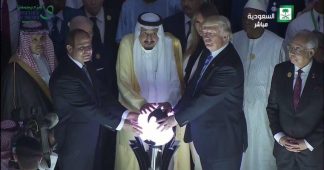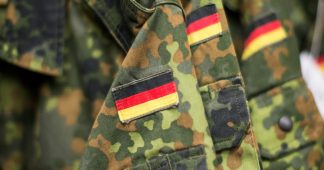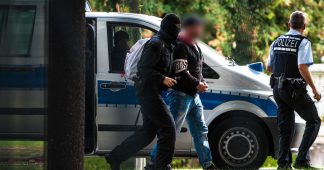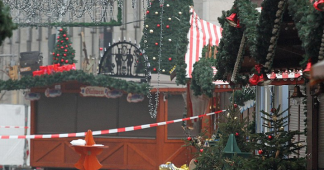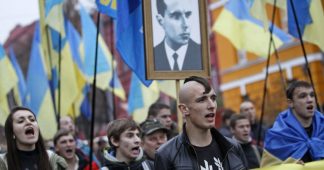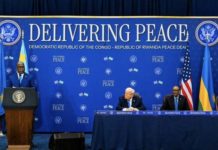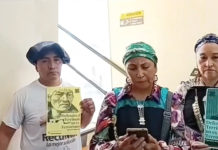By Johannes Stern
28 June 2019
Stephan Ernst, the assassin of CDU politician Walter Lübcke, acted as part of a neo-Nazi network with close ties to the right-wing terrorist National Socialist Underground. Despite efforts in the aftermath of the assassination to promote a lone gunmen explanation, information that links Ernst to a vast right-wing terrorist network is emerging.
After Ernst admitted his guilt on Tuesday, the police carried out raids on Wednesday night and early Thursday, and arrested two additional suspects. They allegedly secured and sold weapons to Ernst. The assassin also allegedly sold weapons to two other as yet unidentified men, who are the subjects of ongoing investigations, according to the Federal Public Prosecutor’s Office.
According to media reports, Ernst admitted that he hoarded weapons, which, in addition to the murder weapon, included a pump-action shotgun, an Uzi submachine gun, and ammunition. He explained how he obtained the weapons and where they were concealed. Investigators found the vast majority of the weapons in an underground depot on the grounds of his employer. There were five weapons in total. According to Ernst, he purchased part of the arsenal in 2014, and bought the murder weapon in 2016.
One of Ernst’s alleged arrested accomplices is the Kassel-based neo-Nazi Markus H. According to ARD’s political magazine Panorama, H. was questioned as a witness in 2006 following the ninth racist murder committed by the NSU in an internet cafe in the Nord Holland area of the city, which claimed the life of Halit Yozgat. Like Ernst, H. was a member of the violent neo-Nazi milieu in Kassel at the time of the murder, and allegedly also knew the victim.
According to Panorama, Ernst and H. were members of the Free Resistance Kassel (FWK) group for several years, during which time they discussed how to procure weapons and explosives. The political magazine reported that Ernst allegedly remained part of the FWK until 2011, and remained in contact with members of the neo-Nazi scene until recently. Asked if Ernst had broken with the neo-Nazi milieu over recent years, the Kassel neo-Nazi Mike Zavallich told Panorama that people don’t leave so quickly, they take a step back, but still have the same outlook as they always did.
Zavallich, who declared his solidarity with Ernst shortly after his arrest and described him as a “good comrade” on Facebook, was among the closest associates of the NSU. According to a report from Die Welt, Zavallich immediately came to the attention of the Federal Criminal Police after the NSU was exposed in November 2011. At the time, investigators had presented a list of 129 people associated with the NSU. Four people from Kassel are among those mentioned on the so-called “129 list.” One of them was Mike Zavallich. He was aware of the existence of the Thuringia Home Guard, an organisation that served as a precursor to the NSU.
Further associates of Ernst with close connections to the NSU are Stanley R. and Bernd T., leading members of the right-wing extremist terrorist organisation Combat 18. There is much to suggest that Ernst had direct contact through these sources to the NSU members Uwe Böhnhardt, Uwe Mundlos, and Beate Zschäpe. In an article in the Hessisch-Niedersächsisch Allgemeine newspaper, the landlady at Ernst’s regular pub, “Stadt Stockholm in Kassel,” stated that in April 2006, around the time of Yozgat’s murder, Bernd T. turned up at the pub with Zschäpe.
According to the Bild newspaper, there was at least one other occasion when Ernst could have had direct contact with the NSU: at the celebrations for the 30th birthday of Stanley R. in the clubhouse of the “Bandidos” rocker club. The guests included Böhnhardt, Mundlos, and probably Beate Zschäpe. The meeting occurred just a few days before Yozgat’s murder on April 6. But a video clip has mysteriously disappeared from the investigation files, prompting Bild to ask the question, “Was Stephan Ernst shown in it?”
The state and security services, which have close ties to the right-wing extremist terrorist networks, are doing everything they can to block a full investigation of the murder. The archives of the Hesse state intelligence service on the NSU will remain sealed until 2044. This was revealed by Hesse’s Interior Minister, Peter Boyth (CDU), during an emergency sitting of the state parliament on Wednesday. The file on Ernst also remains under lock and key.
Already in the five-year trial against the National Socialist Underground, a neo-Nazi terrorist group responsible for 10 murders, two bomb blasts, and a series of bank robberies, the federal public prosecutor did everything possible to avoid examining the role of the security agencies. This approach is now being continued. In his press statement on Thursday, the office’s spokesman, Markus Schmidt, claimed that there was “no evidence to suggest that the three detainees were members of a right-wing terrorist group or had established one.”
Even though the security authorities are doing everything to torpedo the investigation, a clear picture is already emerging based on the facts now known. Ernst was not merely operating as a close associate of the NSU, but the murder of Lübcke could be a continuation of the NSU’s murder series, which claimed the lives of nine immigrants and a police officer between 2000 and 2007.
There is strong evidence that Lübcke was shot due to his pro-refugee stance. In 2015, he opposed right-wingers at a public meeting on the question of providing accommodation for refugees, for which he was responsible as district president. This triggered an online hate campaign that included death threats, which was revived at the beginning of this year, including by the CDU politician and former president of the right-wing Federation of Expellees, Erica Steinbach. According to the Federal Public Prosecutor, Ernst declared in his testimony to the police that his murder of Lübcke was a response to Lübcke’s statements about refugees. He was also allegedly present at the public meeting four years ago.
However, additional motives cannot be excluded. According to a Tagesspiegel report, Lübcke was on the NSU’s radar. The terrorist group included his name in a list of 10,000 names and objects. The Tagesspiegel learned from security sources that Lübcke was listed “in the latter part of the list around the 8,000s.” The newspaper remarked how astonishing it was that his name was on the list at such an early stage. Lübcke only became a target of right-wing extremists in 2015, four years after the end of the NSU’s murder series.
Lübcke perhaps knew too much, or had become an obstacle to the right-wing extremist cliques, which reach into the Kassel district presidium itself. One of the workers under Lübcke was Andreas Temme, an agent of the Hesse Verfassungsschutz (Ministry for the Defense of the Constitution), who was nicknamed “Little Adolf.” He was also at the cafe when Yozgat was murdered. However, Temme claimed not to have witnessed anything, a claim which numerous experts consider to be highly improbable.
Due to several interventions by the security agencies and political figures, Temme’s role is yet to be fully explained. Although Temme testified at the NSU trial held in Munich and to the parliamentary investigatory commissions, former Hesse Interior Minister and current Minister President Volker Bouffier, a personal friend of Lübcke, refused to give Temme unrestricted authorization to testify.
Lübcke’s alleged murderer, Stephan Ernst, was at least indirectly connected to Temme. He knew the neo-Nazi and intelligence agency informant Benjamin Gärtner, codename Vegetable, who spoke to Temme by telephone shortly prior to Yozgat’s murder. During testimony to the NSU investigatory commission in the Hesse state parliament in February 2016, Gärtner confirmed that he knew Ernst as “NPD Stephan.”
Gärtner confirmed a few days ago to a reporter from Spiegel TV that he knew Ernst. But he could not say anything further. He said that he was “given a muzzle at the time” and doesn’t know “what will happen to me if I let the muzzle fall.” No idea how much longer I’d be sitting here at home.” Spiegel TV asked him who he was afraid of. “The government,” he answered.
Published at https://www.wsws.org/en/articles/2019/06/28/
